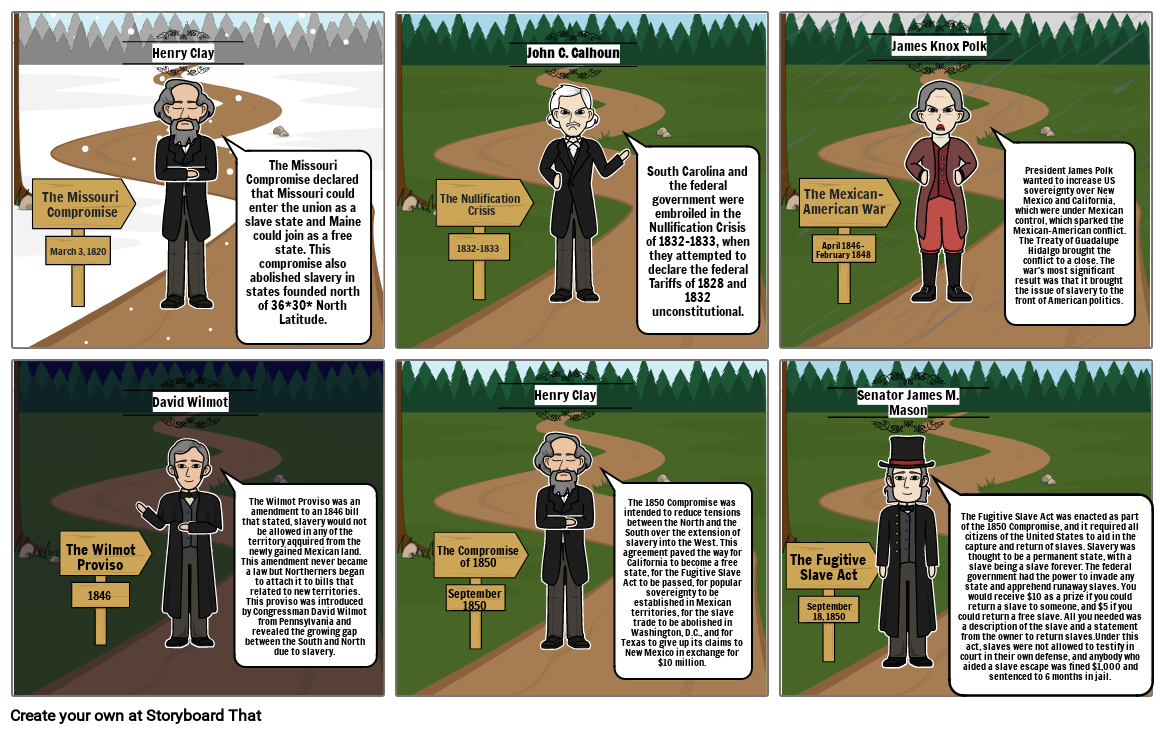history project (civil war)

Storyboard Text
- March 3, 1820
- The Missouri Compromise
- Henry Clay
- The Missouri Compromise declared that Missouri could enter the union as a slave state and Maine could join as a free state. This compromise also abolished slavery in states founded north of 36*30* North Latitude.
- 1832-1833
- The Nullification Crisis
- John C. Calhoun
- South Carolina and the federal government were embroiled in the Nullification Crisis of 1832-1833, when they attempted to declare the federal Tariffs of 1828 and 1832 unconstitutional.
- April 1846–February 1848
- The Mexican-American War
- James Knox Polk
- President James Polk wanted to increase US sovereignty over New Mexico and California, which were under Mexican control, which sparked the Mexican-American conflict. The Treaty of Guadalupe Hidalgo brought the conflict to a close. The war's most significant result was that it brought the issue of slavery to the front of American politics.
- 1846
- The Wilmot Proviso
- David Wilmot
- The Wilmot Proviso was an amendment to an 1846 bill that stated, slavery would not be allowed in any of the territory aqquired from the newly gained Mexican land. This amendment never became a law but Northerners began to attach it to bills that related to new territories. This proviso was introduced by Congressman David Wilmot from Pennsylvania and revealed the growing gap between the South and North due to slavery.
- September 1850
- The Compromise of 1850
- Henry Clay
- The 1850 Compromise was intended to reduce tensions between the North and the South over the extension of slavery into the West. This agreement paved the way for California to become a free state, for the Fugitive Slave Act to be passed, for popular sovereignty to be established in Mexican territories, for the slave trade to be abolished in Washington, D.C., and for Texas to give up its claims to New Mexico in exchange for $10 million.
- The Fugitive Slave Act
- September 18, 1850
- Senator James M. Mason
- The Fugitive Slave Act was enacted as part of the 1850 Compromise, and it required all citizens of the United States to aid in the capture and return of slaves. Slavery was thought to be a permanent state, with a slave being a slave forever. The federal government had the power to invade any state and apprehend runaway slaves. You would receive $10 as a prize if you could return a slave to someone, and $5 if you could return a free slave. All you needed was a description of the slave and a statement from the owner to return slaves.Under this act, slaves were not allowed to testify in court in their own defense, and anybody who aided a slave escape was fined $1,000 and sentenced to 6 months in jail.
Over 30 Million Storyboards Created

